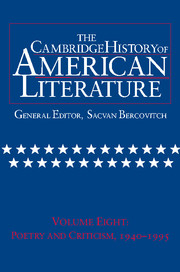Book contents
- Frontmatter
- Introduction
- Poetry, Politics, and Intellectuals
- Introduction
- 1 The Place of Poetry in the Culture, 1945–1950
- 2 Politics
- 3 Rear Guards
- 4 Avant-Gardes
- 5 Authenticity
- 6 Translation
- Conclusion: The Place of Poets, 1995
- Appendix I: Biographies of Poets
- Criticism since 1940
- Chronology 1940–1995
- Bibliography
- Index
Conclusion: The Place of Poets, 1995
from Poetry, Politics, and Intellectuals
Published online by Cambridge University Press: 28 March 2008
- Frontmatter
- Introduction
- Poetry, Politics, and Intellectuals
- Introduction
- 1 The Place of Poetry in the Culture, 1945–1950
- 2 Politics
- 3 Rear Guards
- 4 Avant-Gardes
- 5 Authenticity
- 6 Translation
- Conclusion: The Place of Poets, 1995
- Appendix I: Biographies of Poets
- Criticism since 1940
- Chronology 1940–1995
- Bibliography
- Index
Summary
Imagine a time when a young poet looks to the critical essays published in journals with eagerness, excitement even. Critics would then genuinely influence the poems being written. Young poets would learn their craft from the models also dominating the academic curriculum, and college students would not be mystified by the poems of their near contemporaries – to say nothing of how their instructors would approach contemporary poetry. Critics would then lead the audience for poetry, and poets would be in an indirect relationship with their readers. This would be the sort of culture in which questions of whether literature counts for anything at all might seem implausible. It would also, of course, be one in which literary conventions, period styles, in short, orthodoxies would be easy to establish. Once orthodoxies were in place, one might well have good reason to expect the formation of an avant-garde to move against those conventions, for without established conventions, there can be no avant-garde. In fact, the young poet was Robert Lowell, the time was 1937, and the critics were Allen Tate, T. S. Eliot, R. P. Blackmur, and Yvor Winters. This was the first flowering of the New Criticism. “The world was being made anew,” Lowell thought.
Nothing, it seemed, had ever really been read. Old writings, once either neglected or simplified and bowdlerized into triteness, were now for the first time seen as they were. New Writing that met the new challenges was everywhere painfully wrestling itself into being. Poetry was still unpopular, but it seemed as though Arnold’s “immense future” for literature and particularly poetry was being realized.
- Type
- Chapter
- Information
- The Cambridge History of American Literature , pp. 194 - 212Publisher: Cambridge University PressPrint publication year: 1996

